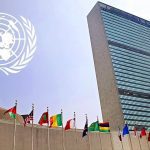The fighting in Gaza continues, and the international community’s stances on the battle change on a daily basis. In the United States, Gaza has triggered an internal crisis, with rifts emerging among various sectors, including the Democratic Party, academia, civil society, the civil rights movements, and Hollywood, in the interest of Palestinians. In Europe, criticisms arose regarding the continent’s continued adherence to the United States’ unquestioning support for Israel without regard for a future objective, a position analogous to the fragmentation of European positions concerning the continent’s blind adherence to the United States during the Ukraine crisis without any clarity regarding a future goal.
Constantly, international press outlets, think tanks, and research centers present a plethora of propositions concerning the future of Gaza. The majority of these propositions are nascent and originate in the West. They are subject to debate and potential modifications, and there is no consensus on them. Nevertheless, there are discussions about them between the United States, Israel, Europe, and several other nations. The majority of these propositions center on denying Hamas’ ongoing control over Gaza and confirming Israel’s desire not to rule the Strip again.
Possible solutions include handing over power in Gaza to the Palestinian Authority (PA) after a transition period of up to three years. With backing and financial assistance from the West and Arab countries, non-political, technocratic individuals assume control of the Gaza Strip’s governance during the transitional period.
There are propositions advocating for the deployment of a multinational international force to ensure security in Gaza, as well as propositions supporting the involvement of a consortium of Arab countries in this regard.
Furthermore, a proposition has been put forth suggesting that the United Nations assume responsibility for Gaza’s administration while maintaining a presence of UN forces—a resurgence of the notion that was initially proposed in August 2014, subsequent to the Israel-Hamas conflict, wherein UN forces could oversee and disarm the Gaza borders—and that the 1948-founded United Nations Truce Supervision Organization (UNTSO) maintains a legal mandate to conduct patrols in Gaza (although it had ceased operations in 1996 subsequent to the Oslo Agreement). With a reorganized mandate, the UNTSO can patrol Gaza’s borders while another international body arranges for donor assistance.
There is also the proposition published by former Palestinian Prime Minister Salam Fayyad in Foreign Affairs, which involves expanding the Palestine Liberation Organization to encompass all the factions, including Hamas and Islamic Jihad, and forming a new government that would assume administration of the West Bank and Gaza.
Additionally, Turkey puts forth the notion of “guarantors” for both the Israeli and Palestinian sides, with one set of countries guaranteeing the Palestinian side, including Turkey, and another set of countries guaranteeing the Israeli side. These guarantors would represent both sides in negotiations and pledge to enact any agreements that are reached, with Turkey possibly deploying troops to the Gaza Strip.
The problem with these propositions is that neither Palestine nor the Arabs have contributed to them. In addition, the PA is hesitant to assume control of Gaza after Israeli tanks destroyed the area, which would make it more difficult to manage the Strip as a whole. Concerns have also been raised about the transitional phase possibly lasting a very long time. Additionally, Hamas cannot be entirely ruled out of future Gaza-related discussions and the technocratic leaders might not win over the public. Seemingly, many of these Western propositions aim to dispose of Gaza’s security burden and shift it to other countries, particularly Arab ones. The primary concern that persists is the absence of any connection between these propositions and a negotiation path that would facilitate a peaceful resolution to the Palestinian cause and a two-state solution.
The aftermath of the conflict will not solely concern Hamas; Israeli Prime Minister Netanyahu’s tenure is expected to conclude following the resolution of this crisis, due to extensive internal scrutiny concerning his pre-crisis approach of containing Hamas.
Considering the paramount importance that Egypt places on the fate of Gaza, Egyptian steadfast position in this matter must be reflected in the following: affirming the need for a Palestinian vision for Gaza’s future, building up Palestinian momentum in Cairo to solidify this vision, establishing mechanisms to facilitate coordination between Egypt and Palestine with regard to Gaza, and reestablishing Palestinian dialogues in Egypt in light of revised perspectives.
While Hamas will not vanish with the war, it is crucial to stress the significance of the PA’s role being restored in Gaza, rejecting Israel’s attempt to retain any portion of Gaza as a buffer zone because doing so will not bring an end to the conflict or provide security for Israel, highlighting the connection between Gaza’s future and the future of the Palestinian cause and the diplomatic route leading to a two-state solution, advancing the notion of forging an alliance for peace as opposed to merely one that combats terrorism.
In conclusion, an Arab summit is scheduled for 11 November and we hope that it will address these issues and provide a comprehensive vision for the future of Gaza and the Palestinian cause.












